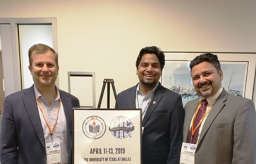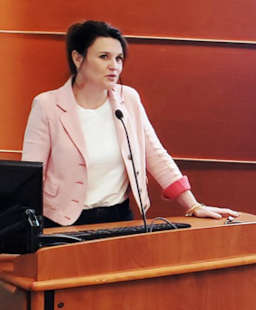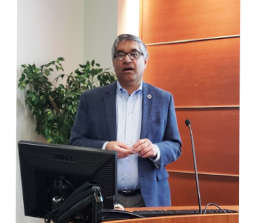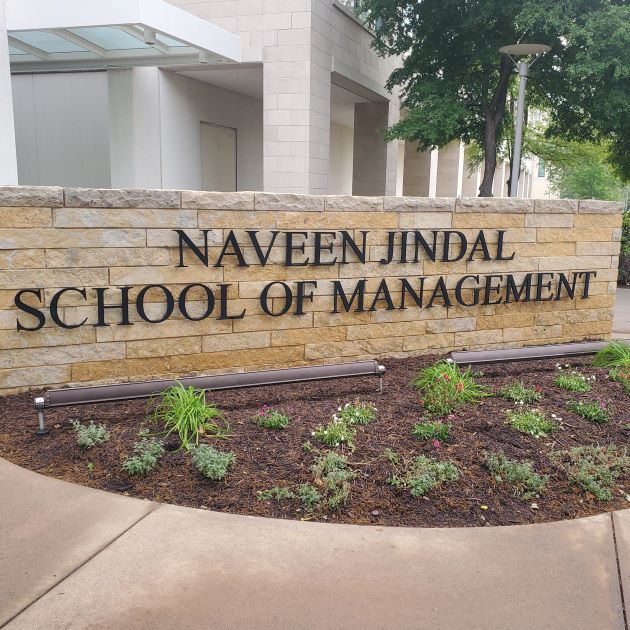Academic leaders from around the world in the information systems field gathered recently at the Naveen Jindal School of Management for the Management Information Systems Academic Leadership Conference. Approximately 80 deans, department chairs, faculty members, and program managers from 50 universities came together to discuss opportunities and challenges related to delivering a high-quality education in information systems.
Carolyn Carlson, director of Microsoft’s Healthcare Intelligent Cloud Technical Sales division delivered the keynote address. She talked about how Microsoft is navigating complex technology transformations in the healthcare industry. Having an industry leader make such a presentation underscored one of the conference’s primary themes — that engagement with industry is critical to fulfilling academic missions.
Panel discussions included graduate programs, undergraduate programs, graduate recruiting, undergraduate recruiting, academic research, Association for Information Systems education initiatives, industry engagement and advisory boards.

Dr. Mark Thouin, director of the Jindal School’s MS in Information Technology and Management degree program, co-chaired the conference with Dr. Atanu Lahiri, associate professor of information systems, and Gaurav Shekhar, program manager of the MS in ITM program. This year marks the first time the conference is affiliated with the Association for Information Systems, an Atlanta-based not-for-profit professional organization that has members in 100 countries.
Thouin said the conference is unique in that it offers an intimate setting in which attendees can interact one on one, exchange ideas and have meaningful conversations.
“In that regard, I think the conference was very successful,” he said. “We had a variety of different panels, ideas, thoughts exchanged — and really, the overall engagement from our IS academic community was outstanding, thought-provoking and beneficial for everyone involved.”
Dr. Andy Wasser, associate dean at Carnegie Melon University’s School of Information Systems and Management, has attended most, if not all, of the conferences over the past eight years, he said. He concurred with Thouin’s assessment.
“Every time I come, I get a sense that I am sharing valuable information with friends and colleagues,” he said. “There’s a clear set of takeaways every year that I can implement. This time around, I can recognize that there are some internal conflicts and trade-offs between research and non-research pursuits, a balancing act of which I need to remain vigilant.

The conference concluded with a lightning round of sorts during which nine MIS educators presented their “Big Ideas,” each in five minutes or less. Presenters included Thouin, who spoke about the success he has had in requiring his graduate students to write post-internship summaries and then post them to LinkedIn. Shekhar and Dr. Dawn Owens, director of JSOM’s BS in Information Technology and Systems program, spoke about capturing the hearts and minds of high school and middle school students, which Owens does through events such as the Hack IT hackathon.

Dr. Deepak Khazanchi, associate dean for academic affairs at the University of Nebraska at Omaha, was another “Big Idea” presenter — his idea: the future of IS is multidisciplinary — and a panelist on the Industry Engagement and Advisory Panel.
“One of the clear takeaways from this conference is that we need to work even more closely with industry,” he said. “We need to do so in way that not only emphasizes work-ready skills but also applied research. Those are the two areas we are hearing a lot.”
Shekhar was excited about being able to showcase the Jindal School’s IS programs, which have robust student enrollment numbers, and share his ideas with the other attendees.
“We have different schools of thought in this room today about how best to administer an IS program,” he said. “The idea of this conference, however, is not to negate each other, but instead to take ideas from all attendees and uniformly apply them as a standard of best practices.”
Next year the conference rotates to the University of Georgia. Dr. Elena Karahanna, L. Edmund Rast Professor of Business and UGA Distinguished Research Professor at the Terry College of Business, will chair the event in hopes, she indicated, of replicating the success of the conference this year.
“It was a very well organized conference,” she said. “It had many interesting, thought-provoking sessions. The mix of panels — some industry, some program-related, some research, some student success — was just right. We hope that we can do just as well next year.”





